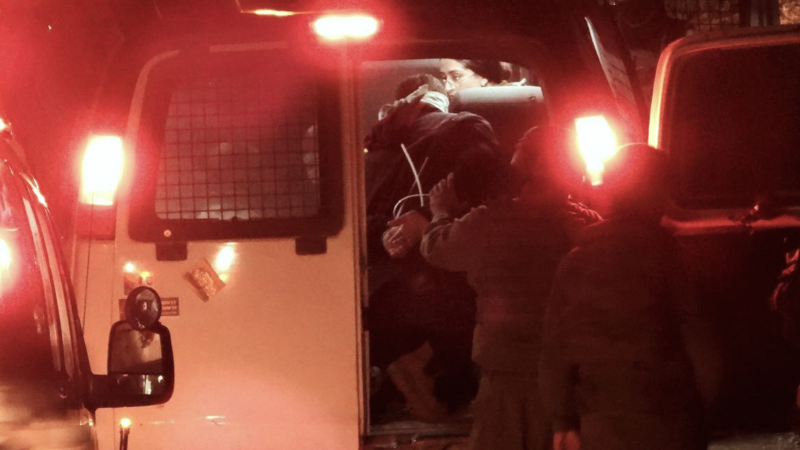Oscar-winning Palestinian director attacked by Israeli settlers, detained by army
JERUSALEM — Israeli settlers beat up one of the Palestinian co-directors of the Oscar-winning documentary film No Other Land on Monday in the occupied West Bank before he was detained by the Israeli military, according to two of his fellow directors and other witnesses.
The filmmaker Hamdan Ballal was one of three Palestinians detained in the village of Susiya, according to attorney Lea Tsemel. Police told her they’re being held at a military base for medical treatment, and she said she hasn’t been able to speak with them.
Basel Adra, another co-director, witnessed the detention and said around two dozen settlers — some masked, some carrying guns, some in Israeli uniform — attacked the village. Soldiers who arrived pointed their guns at the Palestinians, while settlers continued throwing stones.
“We came back from the Oscars and every day since there is an attack on us,” Adra told The Associated Press. “This might be their revenge on us for making the movie. It feels like a punishment.”
The Israeli military said it detained three Palestinians suspected of hurling rocks at forces and one Israeli civilian involved in a “violent confrontation” between Israelis and Palestinians — a claim witnesses interviewed by the AP disputed. The military said it had transferred them to Israeli police for questioning and had evacuated an Israeli citizen from the area to receive medical treatment.
No Other Land, which won the Oscar this year for best documentary, chronicles the struggle by residents of the Masafer Yatta area to stop the Israeli military from demolishing their villages. Ballal and Adra, both from Masafar Yatta, made the joint Palestinian-Israeli production with Israeli directors Yuval Abraham and Rachel Szor.

The film has won a string of international awards, starting at the Berlin International Film Festival in 2024. It has also drawn ire in Israel and abroad, as when Miami Beach proposed ending the lease of a movie theater that screened the documentary.
Adra said that settlers entered the village Monday evening shortly after residents broke the daily fast for the Muslim holy month of Ramadan. A settler — who according to Adra frequently attacks the village — walked over to Ballal’s home with the military, and soldiers shot in the air. Ballal’s wife heard her husband being beaten outside and scream “I’m dying,” according to Adra.
Adra then saw the soldiers lead Ballal, handcuffed and blindfolded, from his home into a military vehicle. Speaking to the AP by phone, he said Ballal’s blood was still splattered on the ground outside his own front door.
Some of the details of Adra’s account were backed up by another eyewitness, who spoke on condition of anonymity out of fear of reprisal.
A group of 10 to 20 masked settlers with stones and sticks also assaulted activists with the Center for Jewish Nonviolence, smashing their car windows and slashing tires to make them flee the area, one of the activists at the scene, Josh Kimelman, told the AP.
Video provided by the Center for Jewish Nonviolence showed a masked settler shoving and swinging his fists at two activists in a dusty field at night. The activists rush back to their car as rocks can be heard thudding against the vehicle.
Israel captured the West Bank in the 1967 Mideast war, along with the Gaza Strip and east Jerusalem. The Palestinians want all three for their future state and view settlement growth as a major obstacle to a two-state solution.
Israel has built well over 100 settlements, home to over 500,000 settlers who have Israeli citizenship. The 3 million Palestinians in the West Bank live under seemingly open-ended Israeli military rule, with the Western-backed Palestinian Authority administering population centers.
The Israeli military designated Masafer Yatta in the southern West Bank as a live-fire training zone in the 1980s and ordered residents, mostly Arab Bedouin, to be expelled. Around 1,000 residents have largely remained in place, but soldiers regularly move in to demolish homes, tents, water tanks and olive orchards — and Palestinians fear outright expulsion could come at any time.
During the war in Gaza, Israel has killed hundreds of Palestinians in the West Bank during wide-scale military operations, and there has also been a rise in settler attacks on Palestinians. There has been a surge in Palestinian attacks on Israelis.
Rideshare union rights, social media limits and other state laws taking effect Jan. 1
Every new year, public media reporters across the country bring us some of the new state laws taking effect where they are. Here are six in 2026.
Guides to help you tackle your New Year’s resolutions
From building your strength to tackling credit card debt, NPR's Life Kit has a newsletter journey to help you tackle your New Year's resolution.
Guides to help you tackle your New Year’s resolutions
From building your strength to tackling credit card debt, NPR's Life Kit has a newsletter journey to help you tackle your New Year's resolution.
Dozens presumed dead in fire at Swiss Alps bar during New Year’s celebration
Dozens of people are presumed dead and about 100 injured, most of them seriously, following a fire at a Swiss Alps bar during a New Year's celebration, police said Thursday.
Warren Buffett officially retires as Berkshire Hathway’s CEO
The legendary 95-year-old investor spent decades building his company into one of the world's largest and most powerful. Now Greg Abel is taking it over.
Crypto soared in 2025 — and then crashed. Now what?
For most of 2025, cryptocurrencies such as bitcoin surged as President Trump vowed to make the U.S. a crypto leader. But now, a severe sell-off has shaken the sector.






